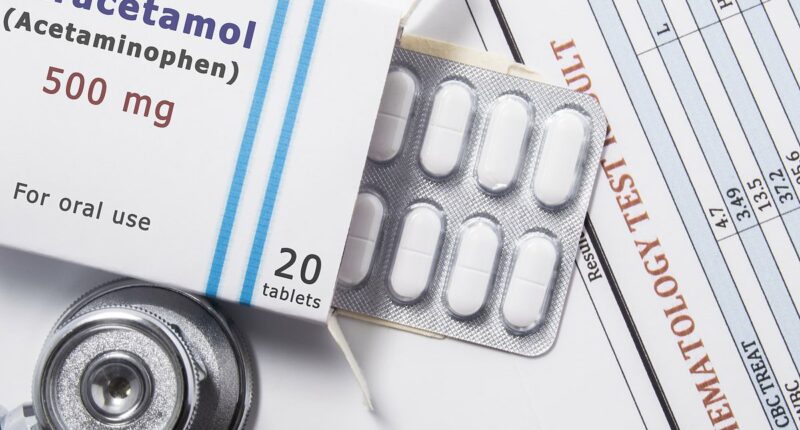Share this @internewscast.com
President Trump is set to reveal a connection between taking paracetamol during pregnancy and autism later today. This is not the first instance where the commonly used painkiller has been pointed out as a potential cause for the neurodevelopment disorder.
Paracetamol, also known as acetaminophen and commonly sold under the brand name Panadol in the UK and Tylenol in the US, is frequently used by pregnant women to alleviate pain, headaches, and fever.
Currently, the NHS advises expectant mothers to primarily use paracetamol as a pain reliever, but only for brief periods and at the minimal effective dosage.
Around half of pregnant women in the UK take paracetamol, and in the US the figure rises to around 65 per cent.
Health authorities suggest that additional caution is necessary for specific individuals, such as those with liver or kidney issues or those on epilepsy medication.
Dozens of studies have already linked it to higher rates of autism and attention deficit hyperactivity disorder (ADHD).
However, recent reports suggest that the 79-year-old US leader will officially declare the connection following a federal investigation into the increasing autism rates in the nation—an effort led by Trump’s polarizing health secretary Robert F Kennedy Jr.
In August, Harvard scientists warned that pregnant women should only take paracetamol under the advice of their doctors.

Dozens of studies have already linked paracetamol, known as acetaminophen in the US, to autism and ADHD
Researchers from Mount Sinai and Harvard’s School of Public Health in the US examined data from over 100,000 individuals, and their study provided the ‘strongest evidence to date’ of this link.
They urged mothers-to-be to use paracetamol sparingly, recommending only ‘the lowest effective dose for the shortest possible time.’
However, the team stressed the findings do not prove the drug directly causes neurodevelopmental disorders—only that the association is consistent and worrying enough to demand further investigation.
Dr Diddier Prada, assistant professor of population health science at Mount Sinai Hospital in New York and co-author of the study, said: ‘Our findings show that higher-quality studies are more likely to show a link between prenatal acetaminophen exposure and increased risks of autism and ADHD.’
He added: ‘Given the widespread use of this medication, even a small increase in risk could have major public health implications.’
But he stressed that women should not suddenly stop taking it.
‘Pregnant women should not stop taking medication without consulting their doctors. Untreated pain or fever can also harm the baby.
‘Our study highlights the importance of discussing the safest approach with health care providers and considering non-drug options whenever possible.’

Fascinating graphs show how ADHD prescriptions in the UK have risen over time, with the patient demographic shifting from children to adults with women in particular now driving the increase
To reach their conclusion, the US researchers reviewed 46 separate studies involving more than 100,000 participants.
The team collected detailed data on when paracetamol was taken—whether in the first, second or third trimester, or throughout the whole pregnancy—and linked it with mothers’ medical records.
Writing in the journal Environmental Health, they concluded: ‘Ultimately, the obtained scores suggest strong evidence of a likely relationship between prenatal acetaminophen use and increased risk of ADHD in children.
‘This includes high-quality studies that provide very strong evidence of an association and studies that provide strong evidence of an association.’
They added: ‘There was strong evidence of a relationship between prenatal acetaminophen use and increased risk of autism in children.’
In 2021, a study using health data from more than 70,000 children in six European countries—including the UK—was analysed by a team from the University of Barcelona.
Fifty-six per cent of the mothers who had children on the autism spectrum or with ADHD took paracetamol while pregnant, the researchers discovered.
Previous studies found that paracetamol can enter the body of the baby and release toxins that have been linked to poorer cognitive performance and behaviour problems in children.
However, experts have long urged for caution about the suggested link.
Professor Andrew Whitehouse, the Angela Wright Bennett Professor of Autism Research at The Kids Research Institute Australia, said that the findings are inconsistent.
Speaking today, he said: ‘There has been research exploring whether taking acetaminophen (also called paracetamol) during pregnancy could increase the likelihood of the offspring of the pregnancy being diagnosed with autism.
‘Some studies have reported small associations, but these findings are not consistent and do not prove that acetaminophen directly causes autism.
‘Autism is a complex condition influenced by many genetic and environmental factors. Any small associations in this area need to be weighed against the risk of untreated high fever in pregnancy for the woman and the developing baby.’
Autism is not a disease and is present from birth, although it may not be recognised until childhood or even much later in life.
It exists on a spectrum: while some people can live independently with little support, others may need full-time care.
Meanwhile, NHS figures show more than 230,000 people in England are now prescribed ADHD medication to manage symptoms such as inattention and hyperactivity.

There have been dozens of studies into the link between paracetamol and autism
Prescription rates jumped by a fifth last year — the sharpest annual rise since records began in 2015.
The surge has been driven largely by women in their 20s and 30s, though prescriptions for children are also climbing.
Experts have voiced concern that some private clinics are over-diagnosing the condition and handing out powerful stimulant drugs too freely.
But others argue that far from being over-diagnosed, many adults are only now getting the help they were long denied.
ADHD was only formally recognised in the UK as a disorder that persists into adulthood in 2008—until then it was seen solely as a childhood problem that children would ‘grow out of.’
In the US, meanwhile, an estimated 2.3 million children and seven million adults have ASD.
Diagnoses have risen sharply over the past two decades, according to shifting statistics from the Centers for Disease Control and Prevention.
In 2000, about 1 in 150 children received an ASD diagnosis; by 2020, that figure had climbed to 1 in 31, a near-quadrupling that reflects both greater awareness and evolving diagnostic criteria.
The surge in the US is further illustrated in a 2024 study of 12.2 million Americans’ health records, which revealed a 175 percent increase in autism diagnoses over an 11-year period.
While some experts attribute the rise to expanded screening and reduced stigma, others argue that biological and environmental factors may also play a role. This debate continues to divide researchers.













